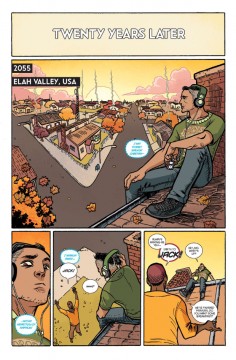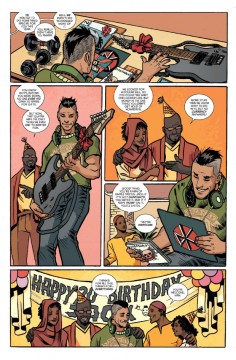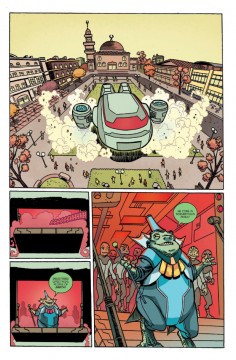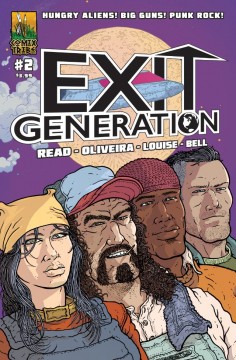“I was hoping to surprise people by inverting the common trope of setting everything in a survivalist state” Exit Generation’s Sam Read talks accidental utopias
 It’s not often you read a ‘post-apocalyptic’ tale where everyone is actually better off after a population eliminating exodus, but that’s the unique twist in Sam Read’s brilliant sci-fi mini series Exit Generation. (Plus there’s also some evil aliens just to make sure everyone isn’t completely happy with their lot). We caught up with Sam to find how he would get on in his own accidental utopian world or if he’d wish that he’d headed for the stars with everyone else!
It’s not often you read a ‘post-apocalyptic’ tale where everyone is actually better off after a population eliminating exodus, but that’s the unique twist in Sam Read’s brilliant sci-fi mini series Exit Generation. (Plus there’s also some evil aliens just to make sure everyone isn’t completely happy with their lot). We caught up with Sam to find how he would get on in his own accidental utopian world or if he’d wish that he’d headed for the stars with everyone else!

Tell us a bit about the inspiration for the series? Was the idea of an over populated Earth the start point or the alien invasion at the end?
SR: I always wanted to write a story set in a ‘post-apocalyptic’ world that showed a different side to the usual zombies, chaos, horror etc that tends to be the way it normally goes. This got me thinking about how a scenario like that might arise, and that’s how I struck on the set up for Exit Generation. The aliens… well, the invasion in issue one really isn’t the “end” of the story, so would possibly be giving a little too much away to talk about what role they really play in the story!
The idea of focusing on the people left behind after a mass exodus is a really fresh take on the post-apocalypse idea as it allows you to be more positive rather than bleak and depressing (apart from all the people dying of course!) was that a conscious choice and were you inspired/reacting against other similar ideas. It reminded us a bit of Wall E.
SR: As mentioned before; the whole ‘accidental utopia’ idea was something I wanted to take a look at. I’ve never really considered Wall-E as an influence, but I guess that is in there somewhere. I guess I was hoping to surprise people a little by inverting the pretty common trope of setting everything in some kind of survivalist state, where anyone who survives is grim and determined, and show a world where human kindness and brotherhood ended up being the important thing… and then show something messing with that too!
The birthday scene where Jack is given loads of stuff but money has become super rare is another great idea, tell us a bit about how that idea came about?
SR: It’s very much related to the above; post-scarcity isn’t something you get quite so much in modern comics. The world is very much defined by modern economics, which is grounded in the concept that ownership and owning are of paramount importance, so I liked the idea of challenging that a little. It also was another way of showing broader unity, and removing a barrier between people.

The book actually had a couple of reviews that knocked off stars because they questioned the viability of this money-less and unified world ever happening, and if I’m honest; I loved that! If you can throw down an idea in fiction that is challenging enough to someone’s perception of the world that they’ll react that incredulously; I consider that a positive.
Artist Caio Olivera has a really great mix of styles how did you two connect and what does he bring to the book?
SR: Caio had worked on a series called ‘No More Heroes’ by a friend and fellow writer Gordon McLean. That was a superhero book, but looking at his art, I was preoccupied with the notion that I’d love to see him do science fiction; something he seemingly hadn’t really drawn before. So I actually wrote the series synopsis for Exit Generation with Caio in mind, then approached him to see if he might have been interested, and thankfully he was!
Can you tell us a bit about the publishing history of Exit Generation? Am I right in thinking you’ve self published before being picked up by ComixTribe? How did you get involved with ComixTribe and what do they bring to the table for you?
SR: Yes, that’s correct; I originally self-published. Having only really done a few short 3-6 page comics before, I wanted to do a bigger project, so I scrimped and saved, and put together a fund to produce a book. I was lucky enough to connect with and bring onto the team for Exit Generation a group of talented people, all of whom were on the brink of or at the point of breaking into bigger name publishers, and they were kind enough to work with me.
The first issue originally came out at the fantastic Thought Bubble event in Leeds (my local comic convention) in 2013, and by the same event the following year, we’d completed the series, so that’s all four issue inside a year. I’d always wanted my first book to come out faster than you might expect an indie book, and so was pleased and grateful to the team (who all ‘levelled up’ that year, and rightly so) for having that happen.

During this time I was enquiring after the possibility of having it put out world-wide on the direct market, and a few different publishers showed interest. But it was ComixTribe who really their support behind it, and after working with them on my direct market debut Find back in January this year, there wasn’t anyone else I saw the book being released by.
You’re releasing digitally and in print, what do you make of digital as an option for self-publishers and small press?
SR: Honestly; I’m not really sure how effective digital is as a channel for books like Exit Generation, mainly as I have no sight of the numbers we’ve done right now.
My experience may have been shaped by having worked in ‘brick-and-mortar’ comic retail for a number of years, but I wonder how ‘visible’ anything outside the larger publishers on Comixology (which is where Exit Generation can be found digitally) really is, when you consider the sheer number of books there.
Don’t get me wrong; I think Comixology do an excellent job of making themselves open to indie books (their Submit programme for one), and I know of people who’ve done very well simply going it alone on that platform. But much of this is through their own, external efforts in driving people to their small corner of the site, in order to make it count. And I know first-hand; that is a LOT of work.
I once was at a comic convention where Warren Ellis was speaking, and he said of digital comics that until their exists the level of individual curation online that you can get in a shop (i.e. people cross-recommending books based on your own, bespoke tastes, rather than simply by characters, authors or publishers) then digital will always be driven by the biggest and most visible companies, and I pretty much agree with that.

It’s a great channel for me and for small publishers (never go out of print, always available wherever you are), and I’m grateful for that. But I’m not sure how well those advantages ‘play’ without things like movies and TV shows or advertising to drive people there. I have to do all that myself!
What can we expect from you next and how much more Exit Generation is there in the pipeline?
SR: Exit Generation is a four part miniseries, so beyond this first issue, you’ll find the next one in shops and on Comixology on 28 October, and I hope people will pop over to pick it up.
In terms of future projects; I tend to keep very quiet about stuff until it is as complete as it can be, as I have a terrible fear of hubris (and in comics it is never far away), but I am working with some really talented folks on a number of different things at the moment, and am really excited about them.
One thing I can mention is a completely mad, last-minute Halloween comic idea called Cops Versus Sharkwolves that my friends Colin Bell, Iain Laurie and myself came up with. We literally decided to try and have a comic out for 31 October only about two weeks before, and have roped in a group of excellent artists to aid us, so we’ll see if we can’t get it complete and available (most likely online) in time for All Hallow’s Eve!
And finally, given the choice, would you stay on earth or head for the stars?
SR: Earth, I think. I’m not the best traveller, and as cool as space is, I think I’d keep my feet on the ground!
You can purchase Exit Generation #1 and #2 from ComiXology for £1.99/$2.99


